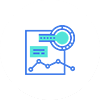
Analytics in Retail
Data-driven decisions for retail success.





16 +
Years' Experience
150 +
Happy Clients
700 +
Project Delivered
24 B+
Project Worth £Unleash the Power of Visual Analytics
Aside from bespoke analytics solutions for Retail, using its extensive knowledge of the retail industry, Smart Statistics has built a retail analytics accelerator solution which takes your retail reporting to near best practice with the thinking and work around the following areas being already completed:
- What to report on and the best way to report on it;
- Reporting best practice architecture to ensure an optimal end-user experience;
- Data types/models required;
- Security and Deployment.
Smart Statistics has a deep understanding of retail businesses having implemented various retail projects in the past. Want to make your retail business more data-driven and transform the customer experience, we can help.
Scalability
To make sure the solution will be able to handle the growing volumes of data and new data sources as your business expands.
AI-based analytics
To enable advanced analytics capabilities, such as intelligent demand forecasting, real-time personalized suggestions for online customers, dynamic pricing optimization, etc.
Essential Integrations
Smart Statistics recommends establishing specific integrations in order to get a 360-degree customer view and comprehensive insight into retail business performance.
Focus on security
To protect sensitive customer, business, and financial data against cyberattacks or unauthorized modification by implementing robust security mechanisms for data backup, encryption, authentication and sharing.


Consider Smart Statistics Services to Implement Your Retail Data Analytics Solution
Smart Statistics offers data analytics consulting and implementation services to help retail businesses quickly respond to market changes and stay ahead of their competitors.
Consulting on retail data analytics
We perform an in-depth analysis of your case to define the most relevant analytics functionality, deliver optimal architecture design and a tech stack, and provide expert advice on security and compliance. You also get a detailed project roadmap with cost and time estimates for risk-free implementation.
Implementation of retail data analytics
We take care of everything: design and implement a tailored retail data analytics solution that is scalable and easy to evolve in the future. With efficient project management, quality assurance, and after-launch support, you promptly get robust software that fully meets your needs.
Retail Data Analytics for a Multibusiness Corporation
Design and Implementation of a Comprehensive Data Analytics Solution.
- Storage of structured and unstructured data from 15+ data sources.
~100 ETL processes that support efficient data quality management. - 5 OLAP cubes and about 60 dimensions for data analytics.
- 360-degree customer view across all channels and business directions.
- Retail analytics of both brick-and-mortar and e-commerce stores.


Data-driven decisions for retail success
Data Visualisation Practices to Improve
Understand key factors that have affected business performance, and drill through to category, subcategory and product level analysis to understand where there is opportunity to improve profitability, and overall business performance.
Focused on Actionable Insights
View sales reps’ figures and track against their targets. Replace your company’s traditional reports with insights that are more actionable, flexible, easy to use, real-time and accessible across all devices.
Get tips & tricks on how to skyrocket your sales
Retail analytics empowers retailers to make data-driven decisions, enhance customer satisfaction, optimize operations, and adapt to changing market conditions. It’s a critical component in the modern retail landscape, where the ability to extract insights from data can provide a competitive edge.

Factors That Drive High ROI of Retail Data Analytics
Scalability
To make sure the solution will be able to handle the growing volumes of data and new data sources as your business expands.
AI-based analytics
To enable advanced analytics capabilities, such as intelligent demand forecasting, real-time personalized suggestions for online customers, dynamic pricing optimization, etc.
Retail Analytics Solution
At Smart Statistics, we develop retail business analytics solutions that match the unique needs of each of our customers. Below, our consultants list the features that are most frequently demanded by our clients in retail industry.
1. Retail data processing and storage
● Automated ingestion of structured and unstructured retail data (e.g., customer data, transaction history, sales by product) from internal and external data sources.
● Cost-effective storing of all data types in a data lake.
● Batch and real-time retail data processing.
● Automated data cleansing: adding missing data to customer profiles, removing redundant product details, etc. and creating a reliable data source ready for analytics querying.
2. Customer analytics
● Automated customer segmentation based on demographic, geographic, behavioral, and other parameters for efficient targeting in loyalty programs, marketing campaigns, and other customer-centric activities.
● Analysis of CSAT, lifetime value, loyalty, average basket composition, number and frequency of purchases by customer and customer segment, etc.
● Calculating customer profitability per product, including total profit per customer, total revenue, costs incurred, etc.
● Retention analytics to identify the expediency of customer retention costs and activities.
● Analyzing customer movement in brick-and-mortar stores with the help of a computer vision system.
3. Retail data analysis and reporting
● Online Analytical Processing (OLAP) for slicing and dicing data across multiple dimensions (e.g., sales per employee, product bundle, store, brand).
● Calculating the required retail KPIs: e.g., conversion rate, average order value, foot traffic, inventory turnover/shrinkage, sell-through percentage.
● Identification of dependencies between multiple variables (demand, sales volume, season, etc.), performing root cause analysis, spotting anomalies, and highlighting potential issues.
● Interactive dashboards for visual data representation with drag-and-drop functionality, slicers, filters, and more.
● Scheduled and on-demand reporting.
4. Supply chain & inventory analytics
● Supplier KPIs: returns by period, order fulfillment rate, promise day adherence, total transportation cost, share in product category, etc.
● Analytics-based selection of the best-fitting product suppliers.
● ML-powered supplier risk forecasting, e.g., prediction of how supplier change can affect product profitability.
● Monitoring inventory by category (on hand, low stock, aged, perishable, etc.) across all supply channels and stores.
● Identifying inventory demand patterns per sales channel, physical location, customer segment, etc. for proper inventory allocation and prediction of out-of-stock and overstock cases.
● Multi-echelon inventory optimization.
● Modeling different supply chain scenarios to mitigate supply chain disruptions.
5. Pricing analytics
● Automated identification of perceived value to understand the maximum price that customers are ready to pay for the product.
● Automated calculation of price elasticity in relation to season, customer segment, store location, etc.
● AI-powered monitoring and analysis of competitor prices and pricing techniques to adjust own tactics.
● Price optimization to identify the most profitable base, markdown prices per product and brand.
6. Sales analytics
● Identifying top selling products and product categories.
● Tracking sales KPIs like sales growth, average conversion time, sales per rep, lead-to-sale percentage, and more.
● Analyzing sales performance at fine granularity, e.g., sales per period, payment mode, store, product purchase frequency.
● Sales forecasting by brand, SKU, product category, season, etc.
7. Marketing analytics
● Promotion analytics to identify the best tactics per customer segment, see how the promoted products affect the basket cost, whether a campaign attracted new customers, and more.
● Optimizing and planning markdown strategies per brand, product, category.
● Calculating marketing campaign KPIs: click-through rate, conversion rate, return on ad spend, etc.
● Evaluating the success of marketing channels based on KPIs and prioritizing the best-performing ones.
● Automatically calculating product affinity to upsell or cross-sell and prevent product cannibalization.
● Analyzing and optimizing loyalty programs based on customer satisfaction and retention rates.
8. Assortment & merchandizing analytics
● Identifying optimal patterns for product display in online and brick-and-mortar stores and optimizing shelf space.
● Calculating assortment performance metrics: product/brand sales per store, margin per unit, product penetration rate across customer segments, etc.
● Identifying the potential of different products to attract traffic in order to shape the product range.
● ML-based planning of assortment based on its predicted performance.
● Identifying products/SKUs/brands to be discontinued/promoted based on the calculated penetration rate, frequency of purchase, customer sentiment, etc.
Smart Statistics helps us quickly identify improvement opportunities by slicing the data of groups with different realities. Without a tool like Smart Statistics, it would have been very difficult to identify these elements.
Claire Smith,
HR ManagerTo be an effective support provider, you’ve got to be able to rely on them. Smart Statistics is always responsive, professional, knowledgeable and there whenever you need them.
Matt Craig,
Technical Services ManagerSmart Statistics has revolutionised the way we make decisions. In a rapidly changing world, data-driven decision-making can be a powerful tool to benefit everyone. Smart Statistics level of deliver and quality of results was outstanding.
Kate Millner,
Business Systems AnalystI am very happy working with Smart Statistics. They always go above and beyond the call of duty, to ensure what they say they will deliver, is delivered.
Simon Wheeler,
Senior Technical SpecialistMy good friend suggested I contact Smart Statistics to design my catering business website including a professional email address. Everything is now set up and live, my customers always comment about how great my business website is and how easy it is to navigate our food menus.













